Roadkill cuisine
Roadkill cuisine is preparing and eating roadkill, animals hit by vehicles and found along roads.
| Part of a series on |
| American cuisine |
|---|
|
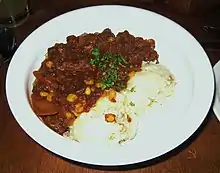
It is a practice engaged in by a small subculture in the United States, southern Canada, the United Kingdom, and other Western countries as well as in other parts of the world. It is also a subject of humor and urban legend.
Large animals including deer, elk, moose, and bear are frequently struck in some parts of the United States, as well as smaller animals such as squirrels, opossum, armadillos, raccoons, skunks, and birds. Fresh kill is preferred and parasites are a concern, so the kill is typically well cooked. Advantages of the roadkill diet, apart from its low cost, are that the animals that roadkill scavengers eat are naturally high in vitamins and proteins with lean meat and little saturated fat, and generally free of additives and drugs.[1]
Almost 1.3 million deer are hit by vehicles each year in the US.[2] If the animal is not obviously suffering from disease, the meat is no different from that obtained by hunting. The practice of eating roadkill is legal, and even encouraged in some jurisdictions, while it is tightly controlled or restricted in other areas. Roadkill eating is often mocked in pop culture, where it is associated with stereotypes of rednecks and uncouth persons.
Preparation
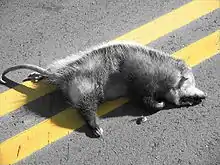
In the United Kingdom, various casseroles may be prepared from badger, hedgehog, otter, rat, rabbit or pheasant where available.[3] Others recommend preparing fox cub or hedgehog in a fricassee.[4] Hedgehog was traditionally eaten roasted with a nettle pudding.[5] Badger must be cooked thoroughly to avoid the risk of trichinellosis[6] (alt. trichinosis, trichiniasis). Roadkill enthusiasts in Canada[7] recommend roasting beaver, which should first be soaked in salted water overnight after removing all fat.[8] There are several roadkill cookbooks, typically with a tongue-in-cheek treatment but containing sensible advice, not least of which is ensuring that the flat meat is fresh and free of disease, and is adequately cooked to destroy bacteria and other contaminants.
Rat should be avoided because of the risk of Weil's disease.
Buck Peterson has written a number of recipe books for this food source including Original Road Kill Cookbook, The International Road Kill Cookbook and The Totaled Roadkill Cookbook.[9][10][11] Roadkill Cooking for Campers by Charles Irion gives advice on outdoor cooking of roadkill.[12] The more discerning may prefer Jeff Eberbaugh's Gourmet Style Road Kill Cooking, which gives advice on converting roadside opossum, deer, turtle or skunk carcasses into tasty treats including squirrel pot pie, groundhog hoagies, creamed coon casserole and road kill stir fry.[13]
Thomas K. Squier, a former Special Forces survival school instructor, argues that wild meat is free of the steroids and additives found in commercial meat, and is an economical source of protein. His book The wild and free cookbook includes a section devoted to locating, evaluating, preparing and cooking roadkill.[14]
Not all sources are serious. According to some, raccoon or opossum are preferable to squirrel, and the taste is improved by aging and marinating the meat in roadside oil and grease before preparing a stew.[15] Alternative recipes for roadkill include raccoon kebabs, moose-and-squirrel meat balls, Pennsylvania possum pot pie and skunk skillet stew. Some of these website recipes are strictly humorous in intent and may pose health hazards, possibly severe, if taken seriously.[16]
There are various intergrades between an animal which has been squashed flat, and an animal which has been hit glancingly and thrown onto the verge. An example of the latter would be a cock pheasant which flew up and tried to challenge a passing car and was thrown on the verge with its skull crushed but no other damage.
As a guide to edibility, the mnemonic "How fresh is it? How flat is it?" serves to remind the would-be eater of the two main characteristics to check before preparing roadkill.
Commonwealth countries
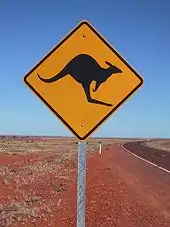
Australia
In Australia, kangaroo meat is produced from free ranging wild animals, typically living on privately owned land.[17] Wild kangaroos are a serious hazard at night in the Australian bush, accounting for 71% of animal-related insurance claims, followed by dogs (9%) and wombats (5%). Most vehicles in the bush are fitted with roo bars to minimize the risk of damage.[18] The meat thus collected may be barbecued or prepared in a roo stew.[19][20] Consumption of native species is only lawful if you possess a valid game hunting or scientific license.[21]
Canada
Motorists in western Canada are at some risk of colliding with bears.[22] Bear collisions have also been reported in Ontario.[23] Bears killed by accident may be donated to needy people for their meat.[24] There is some risk of trichinellosis if bear meat contaminated with Trichinella nativa is under-cooked.[25] In 2008, protesters blocking a new highway in British Columbia set up a kitchen in their camp where they cooked raccoon stew, venison steaks, and bunny burgers using roadkill collected from the TransCanada Highway.[26] Moose were introduced to Newfoundland in 1878, and are now abundant - and a road hazard at night.[27] Until recently, moose that were cleanly killed in road accidents were given to charitable groups. However, in April 2009 the Department of Natural Resources stated that they were going to stop this practice, citing concerns about the provenance. A spokesman stated the department would no longer be: "providing roadkill under which we have no idea about the health of the animal, we have no idea about how the animal was butchered".[28]
United Kingdom
The Independent and ABC News reported on food pioneer Fergus Drennan, "a full-time forager, environmentalist and star of the Fresh One Productions series The Roadkill Chef" broadcast in 2007 by the BBC.[29][30][31][32] Drennan is a critic of factory farming. He does have limits to what he'll eat, "One of the few things that I tend to avoid are cats and dogs. In theory, I'd have no problem with eating them ... [but they've] always got name tags on their collars, and since I have two cats, it's a step too far."[29]
Arthur Boyt is a retired biologist who "has spent the past 50 years scraping weasels, hedgehogs, squirrels and even otters off roads near his Cornish home, and cooking them."[33] Boyt has published recipe books and appeared on television cookery shows and said that roadkill "is good for the body, the environment and the pocket. It's delicious and won't cost much at all. All you need is some veg and herbs."[33] Boyt calls himself a "freegan" and, though a dog lover, does not believe in waste and is especially fond of the taste of labrador retrievers which he compares to lamb.[34]
There have been reports of roadkill poaching in Sherwood Forest, home of the legendary Robin Hood. Apparently the poachers place food such as jam sandwiches on the road to attract deer. When one is killed by a vehicle, they quickly retrieve the carcass for use in game pies and venison steak.[35]
United States
Rules about taking and eating roadkill vary in the United States.[36] The trend has been for increased legal acceptance.[37]
In addition to naturalists in rural areas, cooking and eating roadkill has also been reported among the hobo population.[38]
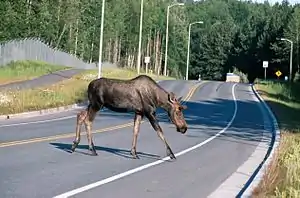
Arizona
§ 17-319. Big game killed by motor vehicle; salvage permit; violation; classification
A. Notwithstanding any other provision of this title, the carcass of a big game animal that has been killed as a result of an accidental collision with a motor vehicle on a maintained road may be possessed and transported by the driver of the vehicle if the driver first obtains a big game salvage permit issued by a peace officer. A person may possess or transport the carcass or any part of the carcass of a big game animal killed as a result of an accidental collision with a motor vehicle only as provided by this section.
Alaska
In Alaska big game roadkill (notably moose and caribou) are considered state property, and the operator of the vehicle that killed the animal must call a state trooper or the division of fish and wildlife protection to report the kill.[39] The troopers will turn the carcass over to charity "if it's not too smooshed".[36] When they receive news of a moose roadkill, volunteers rush to the scene to butcher the animal, which must be quickly bled, gutted and quartered so the meat can cool as fast as possible. The meat is taken to churches, which distribute it to needy families, and soup kitchens make stew.[40] Around 820 moose are distributed in this way each year.[41] Local residents may also register to be included on the "roadkill list" in the more rural areas, ensuring that the valuable meat is not wasted.[42]
Georgia
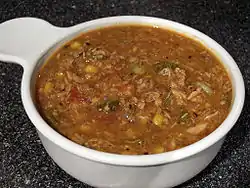
The people of Georgia claim that they invented Brunswick Stew, a traditional dish now eaten throughout the southeastern United States which may also contain roadkill.[43] There is a debate as to whether Brunswick Stew was actually originally made near the town of Brunswick, Georgia, or in Brunswick County in southern Virginia. Mull is another cold-weather dish from Georgia, which may contain almost any type of meat including goat, dove, squirrel and (some say) rat and roadkill.[44]
Illinois
A whitetail deer that is killed/injured due to a collision with a motor vehicle may be legally possessed by an individual if the following criteria are met:
- The driver of a motor vehicle involved in a vehicle-deer collision has priority in possessing said deer. If the driver does not take possession of the deer before leaving the collision scene, any citizen of Illinois may possess and transport the deer.
- There is no limit to the number of deer that may be possessed under these circumstances.[45]
Road kill deer may only be claimed by persons who are residents of Illinois, are not delinquent in child support payments and do not have their wildlife privileges suspended in any state. Individuals who claim a deer killed in a vehicle collision shall report the possession of the road kill deer to the Department of Natural Resources by submitting a report to the IDNR within 24 hours by using the on-line Road Kill Deer Reporting Form or by telephoning the Department of Natural Resources no later than 4:30 p.m. on the next business day.[46]
Kentucky
In Kentucky, the traditional roadkill stew or wild game stew is known as Burgoo, a stew-like soup of squirrel, rabbit, possum, mutton meat (or whatever meat is available) and vegetables, is declining in popularity, perhaps due to declines in traditional hunting. However, it is still widely served in Owensboro, the burgoo capital of the world.
Michigan
For at least the past 30 years, Michigan has allowed individuals who hit a deer to legally possess it. Upon hitting a deer, the driver was required to call local law enforcement and wait for them to come out to the accident scene; the driver could then receive a "Highway Killed Deer Permit" free of charge, if desired. As of Sept 28, 2014, this process has been streamlined[47] and permission can be obtained via telephone by calling the DNR or local law enforcement.
New Jersey
In New Jersey a permit is required for those who want to eat what are sometimes referred to as furry frisbees.[48] In February 2005, following complaints by the New Jersey Society for the Prevention of Cruelty to Animals, Kraft Foods decided to stop production of Trolli U.S. Road Kill Gummies. The society complained that the products, shaped as partly flattened squirrels, chickens and snakes, would give children incorrect messages about the proper treatment of animals.[49]
Tennessee
Tennessee's legislature has considered legalizing the eating of flattened fauna except domestic pets, a proposal that drew a flood of ridicule due to the awkward wording of the bill introduced by state senator Tim Burchett.[50] The bill may not have been entirely necessary: an officer of the Tennessee Wildlife Resources Agency stated that "no wildlife officer would have charged a citizen with possession of road kill with intent to eat."[51]
Texas
In May 2002 representatives of People for the Ethical Treatment of Animals (PETA) called on the Texas legislature to legalize the eating of roadkill.[52] However, a law passed in 2007 to prohibit hunting of wildlife from roads appears to also make collection of roadkill illegal. A Texas Parks and Wildlife official said that "The department strongly encourages all persons to avoid engaging in the collection of any animal life on public roads".[53]
Washington
Washington state began allowing the salvage of roadkill deer and elk in 2016.[54] Salvagers must collect the entire carcass and then print a free permit from the Washington State Department of Fish and Wildlife website within 24 hours of the collection. Roadside deer carcasses cannot be scavenged in Clark, Cowlitz and Wahkiakum counties, because those areas are habitat for the federally protected Columbian white-tailed deer.[55]
In the program's first year, about 1,600 permits were issued for the collection of roadkill deer and elk.[55]
West Virginia
Under West Virginia state code §20-2-4 it is legal to take home and eat roadkill.[56] Jeff Eberbaugh's Gourmet Style Road Kill Cooking was a runaway success in West Virginia when it was published in 1991.[57] The town of Marlinton, West Virginia holds a road-kill cook-off each fall during the last Saturday of September, which attracts thousands of visitors each year.[58] The festival features dishes such as pothole possum stew, fricasseed wabbit gumbo, teriyaki marinated bear, and deer sausage.[59] While the food at this festival doesn't actually involve real roadkill, the dishes are prepared with the kinds of animals that are commonly knocked down by cars.[60]
Wisconsin
A motorist who hits and kills an animal is entitled to keep it, but he must first obtain a free tag from the local authorities (sheriff or police department.) If the motorist who killed the animal does not wish to claim it, anyone else can contact the authorities and request a free tag for the animal.[61]
Finland
Found roadkills are considered waste,[62] while car crashes involving European elk or bear, the meat is inspected and auctioned by police.
Rationales
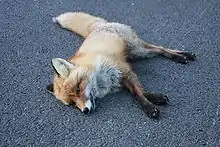
Citing the meat's freshness, that it is organic, and free, some alternative/natural food commenters have taken to scavenging for roadkill.[63] In his book The Revolution Will Not be Microwaved, Sandor Ellix Katz makes the case for eating roadkill in the name of sustainability.[64] Katz talks at length about a North Carolina "earthskills" collective whose members turned to eating roadkill in the spring of 2002, and who have now become a center of information on evaluating, skinning and cooking roadkill as well as turning the hides to good use.[65] Katz's views have been called bizarre and extreme.[66]
In a discussion on the issue the Australian philosopher and animal rights author Peter Singer said,
I am opposed to subjecting animals to unnecessary pain and killing for food. Even so ... when a deer is accidentally hit by a car ... killing the animal to remove the pain is, in my opinion, justified and ethical. If an animal has been killed in an accident or is killed to prevent additional suffering before it dies and if this dead animal is a source of food, why not eat it when it is edible?[67]
The theme of environmental responsibility is taken up in a number of publications by radical environmentalists, such as "Igniting a revolution: voices in defense of the earth".[68] People for the Ethical Treatment of Animals (PETA) wrote a tongue-in-cheek article referencing the phenomenon, which urges non-vegetarians to "kick their unhealthy meat addictions", including a description of roadkill as "meat without murder" and a suggestion that "die-hard meat-eaters can help clear their consciences—and the streets—by eating roadkill."[69]
Nutritional value
Wild animals, the primary constituent of roadkill, are usually lower in calories and saturated fat than domestic meat, while being higher in Omega-3 polyunsaturated fats and slightly lower in overall fat.[70][71] Nutritional values for 100 grams (about 3.5 ounces) of uncooked, lean meat except where otherwise noted:
Calories
kcalProtein
(grams)Fat (grams) Saturated fat
(grams)Cholesterol
(mg)Pronghorn[71] 117 22.4 2.5 ? Badger American black bear, cooked[70] 163 20.1 8.3 ? Beaver[72] 146 24.1 4.8 Bison[71] 104 21.9 1.4 62 White-tailed deer[73] 121 23.5 2.4 1.2 Mule deer[71] 119 22.6 2.7 107 Elk[71] 112 22.4 2.0 67 Frog legs[73] 73 16.5 0.3 0.0 Groundhog[73] 221 30.6 10.6 1.2 Hedgehog Kangaroo[74] 98 22.0 1.0 23 Opossum[73] 221 30.6 10.6 1.2 Pheasant[72] 133 23.6 3.0 1.2 66 Quail (breast w/o skin)[73] 122 22.3 3.5 1.2 Rabbit[73] 114 22.3 2.4 1.2 Raccoon[73] 211 24.7 11.8 3.5 82 Squirrel[73] 119 21.2 3.5 0.0 Turkey (wild - white meat)[73] 158 21.2 7.1 2.4 Turtle[73] 89 20.0 0.6 0.0 Beef (range-grazed)[71] 112 21.8 2.4 72 Beef (grain-fed)[71] 136 21.7 5.0 75
Popular culture
Roadkill stew has become part of North American popular culture. A frequently told joke about rednecks or other groups of rural people asks how many it takes to eat a raccoon or opossum, with the punch line "Three. Two to do it and one to watch for cars".[75] "Road Kill Stew", sung to the tune of "Three Blind Mice", is sung at some summer camps.[76] Many artists have recorded variants on the theme, such as Joe Adee with his Road Kill Stew Possum Tour and Honky Tonk Confidential with their album Road Kill Stew and Other News.[77][78]
Clinton Tyree, also known as Skink, is a recurring character in novels by Carl Hiaasen. He is a former governor of Florida "turned environmental guerrilla" who lives rough in the Florida wilderness and regularly eats roadkill.[79][80][81]
The term "Roadkill Cafe" is sometimes considered a joke, with the tagline "You kill it, we grill it" or "From your grill to ours". However, there are several real Roadkill Cafes in existence, none known to be associated with each other.
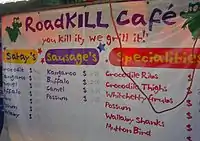 Roadkill Cafe at the Mindil Beach Sunset Markets in Darwin, Australia, carrying the motto "You kill it, we grill it "[82]
Roadkill Cafe at the Mindil Beach Sunset Markets in Darwin, Australia, carrying the motto "You kill it, we grill it "[82]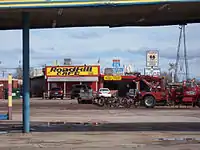 Roadkill Cafe in Seligman Arizona
Roadkill Cafe in Seligman Arizona
See also
References
- Liz Lewis (August 13, 2009). "Road Kill Diet – A Sign of the Times?". b5media. Retrieved 2009-08-16.
- "Top Five States For Deer–Related Collisions Named". statefarm.com. Retrieved June 6, 2015.
- Elliott, Valerie (January 31, 2006). "Fed up with Jamie? So try roadkill – rat or badger". London: The Times (UK). Retrieved 2009-08-15.
- "Road kill man eats rat stew and hedgehog casserole". Associated Newspapers Limited. August 2, 2009. Retrieved 2009-08-15.
- Pidd, Helen (14 September 2007). "Roast hedgehog and nettle pud - a slap-up feast for ancient Britons". London: Guardian (UK). Retrieved 2009-08-28.
- "ProMED Summary of Trichinellosis Outbreaks (2001-2005)". Trichinella.org. Archived from the original on 2008-12-26. Retrieved 2009-08-28.
- Winsa, Patty (May 25, 2012). "Road kill: 3,000 raccoons, 1,300 cats and more are casualties of city streets annually". thestar.com.
- Wilson, Marilyn (November 10, 2010). "Roast Beaver Recipe". alaskaoutdoorjournal.com. Archived from the original on October 26, 2013. Retrieved October 12, 2014.
- The Original Road Kill Cookbook. Ten Speed Press. 1985. ISBN 0-7946-0255-X.
- The International Road Kill Cookbook. Ten Speed Press. 1994. ISBN 0-89815-567-3.
- The Totaled Roadkill Cookbook. Celestial Arts. 1996. ISBN 0-89087-812-9.
- Charles G Irion (2009). Roadkill Cooking for Campers. Irion Books. ISBN 978-0-615-29836-8.
- Jeff Eberbaugh (1991). Gourmet Style Road Kill Cooking and Other Fine Recipes. Unique Publications. ISBN 0-9629996-0-1.
- Thomas K. Squier (1995). The wild and free cookbook. Loompanics Unlimited. ISBN 1-55950-128-6.
- "ROAD KILL STEW". The FOURnet Information Network. Retrieved 2009-08-15.
- "Roadkill Recipes". The Globe-Guardian. Archived from the original on 2009-08-23. Retrieved 2009-08-15.
- "Eat kangaroo to 'save the planet'". BBC News. 9 August 2008. Retrieved 2008-10-23.
- Edwards, Lorna (2007-09-24). "Drought leads to big rise in 'roo roadkill". Melbourne: The Age Company. Retrieved 2009-08-15.
- Bob Beale (11 August 2008). "Fry me kangaroo down". G Magazine. Retrieved 2009-08-15.
- "Roo Stew". Intown Entertainment. Retrieved 2009-08-15.
- "Scientist Len Zell eats road kill and isn't afraid to admit it". news.com.au. 2013-08-22. Retrieved 2014-10-14.
- "BEARS & BIKES: Regina firefighter recalls chilling collision between his motorcycle and a grizzly bear". Canwest Publishing. August 14, 2009. Retrieved 2009-08-16.
- KRISTY NEASE (June 15, 2009). "Motorcyclist injured in collision with bear". THE OTTAWA CITIZEN. Retrieved 2009-08-16.
- Marian Engel (1987). Bear. David R. Godine. ISBN 0-87923-667-1.
- "An outbreak of trichinellosis due to consumption of bear meat infected with Trichinella nativa, in 2 northern Saskatchewan communities". University of Chicago Press. Retrieved 2009-08-16.
- "Road Kill: New Highway Stopped By Protesting "Raccoons"". Mostly Water. 2008-01-20. Retrieved 2009-08-16.
- "Moose". Newfoundland Coastal Safari. Retrieved 2009-08-15.
- "Moose stew". The Telegram (Newfoundland). July 4, 2009. Retrieved 2009-08-15.
- "From foxes to pheasants, seaweed to slugs, everything's fair game for The Roadkill Chef. Guy Adams joins him scavenging for supper." The Roadkill Chef: Hunting for dead tasty meals 1 March 2007 The Independent
- Wild Man, Wild Food: The Roadkill Diet 'Fergus the Forager' Serves Up Squirrels, Pheasants and Plenty of Food for Thought March 30, 2007 ABC News
- "In Road Kill Cafe, professional forager and road-kill chef Fergus Drennan tries to persuade the public that eating road-kill is acceptable." Spooks spin-off set for BBC Three 14 December 2006 BBC News
- Drive-by cooking December 15, 2006 Adelaide Now
- Steven Morris How to make a perfect casserole: just add badger 2 January 2008 The Guardian
- Welcome to my roadkill kitchen February 20, 2006 The Standard/ The Sunday Telegraph
- Steven Morris (15 January 2008). "Jam sandwich bait traps deer on roads". London: The Guardian, UK. Retrieved 2009-08-17.
- Vicky Edwards Gehrt (November 14, 1995). "SMASHING SUCCESS SNIFF IF YOU MUST, BUT ROAD KILL IS A HIT ACROSS THE COUNTRY". Chicago Tribune. p. 5.
- Frosh, Dan (August 15, 2013). "Roadkill Gains Traction as a Home Menu Item". The New York Times. Retrieved August 19, 2013.
- STORE OUSTS MAN FOR EATING ROADKILL December 9, 1994, in The Pantagraph - Bloomington, Illinois
- 5 A.A.C. 92.220(b).
- Kim Severson (September 17, 2008). "A political punch line is dinner in Alaska". New York Times. Retrieved 2009-08-16.
- "In Alaska, Salvaged Roadkill Becomes Dinner for the Poor; About 820 Moose Killed by Vehicles and Trains Each Year". Washington Post. February 17, 2002. Archived from the original on October 26, 2012. Retrieved 2009-08-16.
- "Road Kill Sandwich". wordpress. January 12, 2009. Retrieved 2009-08-16.
- "Squirrel Road Kill Brunswick Stew". SOAR: The Searchable Online Archive of Recipes. Retrieved 2009-08-17.
- "Mull". The New Georgia Encyclopedia. Retrieved 2009-08-16.
- "DEER ACCIDENTALLY KILLED/INJURED BY A MOTOR VEHICLE". Illinois DNR. Archived from the original on 2012-10-18. Retrieved 2011-11-27.
- "Salvage/Road Kill Deer Reporting System". Illinois DNR. Retrieved 2019-05-23.
- Victor, Skinner (2014-08-14). "New road kill legislation is signed into law". Outdoor News. Retrieved 9 July 2015.
- Mike Jaccarino (2003-02-24). FOR ROADKILL GOURMETS, IT'S FINDERS EATERS "FOR ROADKILL GOURMETS, IT'S FINDERS EATERS" Check
|url=value (help). Press of Atlantic City. Retrieved 2009-08-16. - "Trolli Road Kill dies under pressure from animal activists". Candy Business. March 1, 2005. Archived from the original on October 26, 2012. Retrieved 2009-08-16.
- DAVID FIRESTONE (March 14, 1999). "Statehouse Journal; A Road-Kill Proposal Is Food for Jokesters". New York Times. Retrieved 2009-08-16.
- Walter Jowers (February 11, 1999). "Road Kill Bill: You kill it, you grill it". Nashville Scene. Archived from the original on January 29, 2013.
- John Kelso Hey, PETA, I ran over an entree today May 26, 2002 Austin American-Statesman
- "New Law Prohibits All Hunting of Wildlife From Roads". Texas Parks and Wildlife. July 9, 2007. Retrieved 2009-08-18.
- Eldridge, Keith (July 15, 2016). "New Washington law allows residents to harvest roadkill". KOMO-TV. Retrieved May 5, 2019.
- Bush, Evan (July 25, 2017). "Dining on roadkill: Washington residents gather 1,600 deer, elk in law's first year". The Seattle Times. Retrieved May 5, 2019.
- Adam Lloyd. "Roadkill Cook-Off". Travelprose. Archived from the original on 2009-05-17. Retrieved 2009-08-15.
- "Road-kill recipe book splatters across West Virginia". Lexington Herald-Leader (KY). June 9, 1991. p. B2. Retrieved 2009-08-15.
- "Roadkill cook-off, Spam Jam lure bold foodies". CNN. May 14, 2009. Retrieved 2009-08-15.
- "Pocahontas County's 22nd Autumn Harvest Festival & 17th Annual WV Road Kill Cook-Off". Pocahontas County Chamber of Commerce. Retrieved 2009-08-15.
- Nancy Davidson. "World's Weirdest Food Festivals." Food and Wine. http://www.foodandwine.com/articles/world-weirdest-food-festivals
- John Ellis DNR Q&A: DNR Q&A: Taking Antlers from Roadkill
- Archived 2017-08-02 at the Wayback Machine(In Finnish)
- Sandor Ellix Katz Road kill: it's fresh it's organic it's free, July 28, 2009 Chelsea Green Publishing Alternet.org
- Sandor Ellix Katz (2006). The Revolution Will Not be Microwaved: Inside America's Underground Food Movements. Chelsea Green Publishing. ISBN 1-933392-11-8.
- "Eating Roadkill: Would You?". Chelsea Green. Retrieved 2009-08-24.
- "'Green Anarchist' Trumpets 'Roadkill' Diet to Save Mother Earth - Scavenging for dead animals killed by the 'car culture' described as the more 'ecological choice.'". Business & Media Institute. 2009-07-28. Archived from the original on August 7, 2009. Retrieved 2009-08-24.
- "Peter Singer - The Genius of Darwin: The Uncut Interviews". Richard Dawkins. June 15, 2009. Retrieved 2009-08-24.
- Steven Best, Anthony J. Nocella (2006). Igniting a revolution: voices in defense of the earth. AK Press. ISBN 1-904859-56-9.
- Meat without murder PETA
- "Nutrition of Wild Game Meat". Alaska Department of Fish and Game. Retrieved 2009-08-28.
- "Nutritional Content of Game Meat" (PDF). University of Wyoming. August 2002. Archived from the original (PDF) on 2011-01-24. Retrieved 2009-08-28.
- "USDA National Nutrient Database". US Department of Agriculture. Archived from the original on 2015-03-03. Retrieved 2009-08-28.
- "WILD GAME: FROM FIELD TO TABLE" (PDF). University of Kentucky - College of Agriculture. Retrieved 2009-08-28.
- "NUTRITIONAL PROPERTIES OF KANGAROO MEAT". Southern Game Meat. Retrieved 2009-08-28.
- "Redneck Jokes". mudfacemarge.com. Archived from the original on 2009-08-28. Retrieved 2009-08-23.; "One Liner Redneck Jokes". jokesnjokes.net. Archived from the original on 2009-09-02. Retrieved 2009-08-23.; "redneck jokes". roadkill-cafe.com.; all retrieved August 23, 2009.
- "Road Kill Stew". ultimatecampresource.com. Retrieved 2009-08-15.
- "Road Kill Stew Possum Tour". All Media Guide. Retrieved 2009-08-15.
- "Road Kill Stew and Other News". PayPlay LLC. Retrieved 2009-08-15.
- Sally Biel Oct 15, 1995 page F.4 Richmond Times Dispatch (Richmond, Virginia)
- Mark Chapman Can't beat the real thing - Hiaasen attempts to improve on his classics] Feb 3, 2002 page 059 Boston Herald (Boston, Mass.)
- Carl Hiaasen (1989). Double whammy. Warner Books. ISBN 0-446-35276-4.
- McCue, Sam (2009). "Darwin Markets". Australian Gourmet Traveller. Sydney, Australia: ACP Magazines (3).
External links
- "Roadkill Helper". Michael Lehet (on Flickr). Retrieved 2009-08-16.